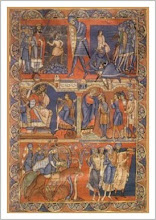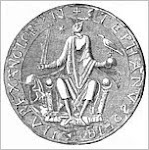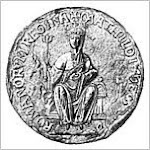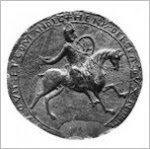• Postscript: A Last Word on Stephen and Contemporary Sources
The Peterborough Chronicle:
"Þa the suikes undergæton ðat he milde man was and softe and god, and na iustise ne dide, þa diden hi alle wunder"
"When the traitors understood that he was a gentle man, and soft and good, and did not execute justice, they committed all manner of atrocity."
"æuric rice man his castles makede and agænes him heolden; and fylden þe land ful of castles. Hi suencten suyðe þe uurecce men of þe land mid castelweorces; þa þe castles uuaren maked, þa fylden hi mid deoules and yuele men. Þa namen hi þa men þe hi wendan ðat ani god hefden, bathe be nihtes and be dæies, carlmen and wimmen, and diden heom in prisun and pined heom efter gold and syluer untellendlice pining; for ne uuaeren naeure nan martyrs swa pined alse hi waeron."
"Every chieftain made castles and held them against the king; and they filled the land full of castles. They viciously oppressed the poor men of the land with castle building work; when the castles were made, then they filled the land with devils and evil men. Then they seized those who had any goods, both by night and day, working men and women, and threw them into prison and tortured them for gold and silver with uncountable tortures, for never was there a martyr so tortured as these men were."
The chronicler writes that people said openly that Christ slept, along with His saints; this — and more than we can say — we suffered 19 winters for our sins.
The Gesta Stephani:
Authorship of Gesta Stephani is uncertain, possibly written by Robert, Bishop of Bath.
• Gesta Stephani Online
The Anglo-Saxon Chronicle:
• The Anglo-Saxon Chronicle
Henry of Huntingdon:
• Henry of Huntingdon
William of Newburgh:
• William of Newburgh
Miscellanea: Number of Surviving Charters
Stephen - 720
Matilda - 88
From a chronicler who wrote under the patronage of Robert of Gloucester:
"By his good nature and by the way he jested and enjoyed himself even in the company of his inferiors Stephen earned an affection that can hardly be described."
History writes that Stephen was an affable, easygoing and popular man who was a competent commander and a brave, chivalrous knight. However he lacked the judgement, skills, and ruthlessness needed to be an effective ruler, to control his barons and ensure their loyalty. Many illegal castles were built during his reign and private armies were recruited which enabled unruly barons to wage war on one another. It was the ordinary people who suffered when towns were looted and burnt and crops and livestock destroyed. Fortunately however, England and her people of course survived and recovered from the deeds of both Stephen and Matilda, The Empress, and went on to be ruled by Henry II, credited in the history books as one of England's most impressive kings.
28 August 2010
Subscribe to:
Post Comments (Atom)








No comments:
Post a Comment